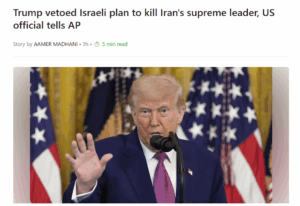The Complex Dynamics of Assassination in Geopolitics: A Deep Dive
As geopolitical tensions rise, discussions surrounding the potential assassination of key leaders are becoming more common. One significant question arises: if Iran’s leadership were to fall, what chaos could ensue? Let’s unpack this critical issue, especially concerning the potential ramifications of such actions within the Middle East.
Understanding the Power Vacuum
The aftermath of Saddam Hussein’s fall serves as a prominent historical example. The rapid removal of a regime led to sectarian violence and the ascent of ISIS, demonstrating the intricate interplay between power and chaos. Should Iran’s leadership collapse, observers warn that a similar power vacuum could emerge, potentially triggering extensive violence and civil unrest.
The dynamics at play are further complicated by the presence of various ethnic clans and groups vying for power. With the United States seeking to adopt a more non-interventionist stance, it must tread carefully. The rise of ethnic and sectarian conflict could compel U.S. involvement, but not against formal state structures—rather, in skirmishes with fragmented ethnic entities.
Historical Precedents and Lessons Learned
Historically, the assassination of leaders has often backfired, leading to unintended consequences. The tragic assassination of Archduke Franz Ferdinand in 1914 illustrates how targeted killings can catalyze broader conflicts. Similarly, Julius Caesar’s assassination transitioned Rome from a Republic to an Empire, highlighting that removing a centralized power may not result in stability, but rather an infusion of radical elements into leadership.
This historical perspective is crucial as we evaluate current events. For instance, the upheaval following Iraq’s invasion starkly contrasts the initial celebrations, as a wave of violence ultimately created conditions ripe for terrorism. Removing centralized authority can result in warlordism or civil conflict, much like Libya did post-Gaddafi, making it nearly impossible to negotiate peace and deliver humanitarian aid in the aftermath.
The Risks of Assassination
The moral, strategic, and political risks of assassinating a head of state are significant. Not only do such acts escalate violence, but they also galvanize public support for the targeted regime, converting leaders into martyrs and unifying previously fractured societal segments against perceived aggressors.
Recent events have echoed this sentiment as Israel’s attempts to eradicate Iranian leadership have not only failed but have also intensified anti-Israel sentiments across the region. Mohammad Pakpour, commander of Iran’s Revolutionary Guard Corps, has issued potent threats of retaliation, underscoring the reciprocal nature of violent actions in geopolitics.
Diplomatic Fallout
The elimination of key leaders also strips away potential diplomatic channels. As seen in the case of Slobodan Milošević, assassination complicates future efforts to negotiate and govern, making re-engagement challenging. In the context of the U.S.-Iran relationship, the assassination of high-ranking officials has historically exacerbated tensions, culminating in more entrenched hostility.
Further, the notion of “tyrannicide” often inflates ideological divides, inflaming public sentiment against the initiating state. The killing of Qasem Soleimani in 2020 elicited a wave of anti-American activism that countered U.S. interests in the region.
Global Economic Implications
Israel’s current strategies are not without repercussions on global economics. As tensions escalate, oil prices soar, complicating relations with Gulf states that might not wish to see shipping through the vital Strait of Hormuz disrupted. The economic ramifications extend far beyond the immediate region, echoing through global markets and international relations.
Conclusion: A Call for Strategic Restraint
As we reflect on these complex geopolitical dynamics, it becomes increasingly clear that assassination is not a viable solution for achieving lasting peace or stability. Historical examples warn us that achieving true change requires systemic approaches and the establishment of diplomatic relations rather than isolated acts of violence.
If you’re interested in further discussions about the implications of foreign policy on global economics and security, join the Extreme Investor Network community. We provide unique insights and perspectives to empower informed investment decisions and discussions about the complexities of our world today. Stay ahead of the curve with us as we analyze the potential repercussions and opportunities within evolving geopolitical landscapes.

